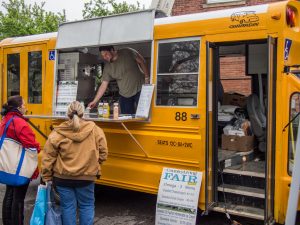 Secretary of Education Betsy DeVos made headlines this week at Harvard University. I’m still confused as to why Harvard invited her to speak at an event allegedly focused on public education–she never attended a public school, never sent her own children to a public school, never studied education, and has never taught anyone anything–and the reaction to her talk suggests that a lot of folks agree with me.
Secretary of Education Betsy DeVos made headlines this week at Harvard University. I’m still confused as to why Harvard invited her to speak at an event allegedly focused on public education–she never attended a public school, never sent her own children to a public school, never studied education, and has never taught anyone anything–and the reaction to her talk suggests that a lot of folks agree with me.
Perhaps because Betsy doesn’t know much about schools…or students…or teachers…or education, she tends to reach for analogies for what schools are like that just don’t make much sense. Her last tortured analogy was that schools should be run like Uber…
“How many of you got here today in an Uber, or Lyft, or another ridesharing service? Did you choose that because it was more convenient than hoping a taxi would drive by? Even if you didn’t use a ridesharing service, I’m sure most of you at least have the app on your phone.
Just as the traditional taxi system revolted against ridesharing, so too does the education establishment feel threatened by the rise of school choice. In both cases, the entrenched status quo has resisted models that empower individuals.
Nobody mandates that you take an Uber over a taxi, nor should they. But if you think ridesharing is the best option for you, the government shouldn’t get in your way.”
Betsy’s analogy here conveniently ignores the fact that taxi companies are not remotely “like” public schools. Taxi companies are not publicly owned or operated; they are not funded by taxpayer dollars; they are not governed by elected school boards; they are not responsible for “serving” all of a community’s residents. Her analogy also omits the inconvenient truth that ride sharing apps like Uber and Lyft have competed unfairly with taxi companies in many major metropolitan areas by relying upon unqualified and uncertified drivers, and paying those drivers at rates that are much lower than the prevailing wage for cab drivers in that region. Further, due to a lack of regulations, there have been many reported incidents of Uber drivers behaving inappropriately, including sexually assaulting their passengers.
Recently, Uber’s CEO, Travis Kalanick, was forced to resign amidst “allegations of harassment, discrimination and an aggressive culture“, suggesting that the ride sharing company’s corporate culture, management style, and lax oversight procedures (“Neither Uber nor Lyft uses fingerprints or law enforcement to background-check their drivers. And Uber doesn’t even bother to meet with drivers in person before allowing them to ferry passengers.”) were rotting from the head.
Hmmm…complete lack of regulatory guidelines…hiring unqualified employees…underpaying and overworking their employees…refusing to let their employees unionize…CEO scandals and predatory business practices…maybe Betsy was thinking that Uber’s model reminded her of how charter schools are run?
But I digress…
 Ms. DeVos’ most recent fractured fairy tale about schools is that they are like…get ready for this one…”food trucks“!
Ms. DeVos’ most recent fractured fairy tale about schools is that they are like…get ready for this one…”food trucks“!
“Near the Department of Education, there aren’t many restaurants. But you know what — food trucks started lining the streets to provide options,” DeVos said. “Some are better than others, and some are even local restaurants that have added food trucks to their businesses to better meet their customers’ needs.”
“Now, if you visit one of those food trucks instead of a restaurant, do you hate restaurants? Or are you trying to put grocery stores out of business?” she asked. “No. You are simply making the right choice for you based on your individual needs at the time.”
Peter Greene (aka Curmudgucation) points out why this is such a terrible, horrible, no good, very bad idea…
“Note that DeVos continues to drift further and further away from any interest in accountability for quality– in this analogy we pick the choice that tastes good, and if it happens to be unhealthy or toxic or laced with fried dog meat, none of that matters. Taste is not a bad guide for matters of food, but with schools, what “tastes good” today is not necessarily what will best serve the student, the family, the community and the nation over the coming decades. “Tastes good this moment” and “provides a solid education for a lifetime” are two entirely different metrics.
“Like every other commercial enterprise, the food trucks of DC are not geared to handle all customers. There are many reasons that comparing schools to businesses is a huge fail, but this is one of the hugest–there is no business sector in this country built on the idea of serving every single person in the country. Each food truck operates on the idea that some people will eat there and other people won’t, and as long as enough people eat there, the food truck is good. But if there are people who don’t eat at any of the food trucks, some people who don’t eat at all–well, that is not the food truck operators problem.”
At the risk of being pedantic (sorry, occupational hazard…), let me join Mr. Greene in helping Ms. DeVos understand why comparing public schools to food trucks, or even to restaurants, makes so little sense…
- Restaurants and food trucks serve very different purposes.
If I’m looking to celebrate a special occasion, like a birthday, anniversary, or promotion, I make a reservation at a favorite restaurant, not a food truck. If I think of a meal as an opportunity to engage in thoughtful conversation with special friends, savor delicious food and drink, and linger in a beautiful atmosphere, I seek out a fantastic restaurant–not a food truck. On the other hand, if I’m in a hurry and need to grab a quick bite to eat, the food truck beats most restaurants hands down.
The point is that, in spite of what Ms. DeVos is suggesting here, food trucks can’t “replace” restaurants. Even if they may be more convenient at times, or cheaper, food trucks are not a substitute for a full-service restaurant–in much the same way that charter schools are not a substitute for traditional public schools. And pretending that they are is either naive or ignorant. Or both.
- Food trucks do not offer, and are not required to provide, the same range of services as restaurants, and are therefore competing on an uneven playing field.
Restaurants in most places are required to provide rest rooms for their patrons–not so for food trucks, where a stack of napkins and the occasional “wet nap” is all you’re going to get. This difference in what constitutes the “overhead” costs for restaurants vs. food trucks means that the initial investment to get in to the food truck arena is usually just a fraction of what it takes to open a full-service restaurant. Restaurants are also subject to regular inspections for food safety and cleanliness–regulations that have posed a significant hurdle for many in the food truck business. Similar discrepancies are present in the education sector, where charter schools in states like Michigan are held to only the most perfunctory of regulatory oversight, while the public schools in the state are subjected to much higher levels of accountability and scrutiny.
Another advantage for food trucks is that they do not have to pay property taxes, unlike brick-and-mortar restaurants. Charter schools that “co-locate” in public school buildings often reap similar advantages in terms of facilities costs, further skewing the playing field in their favor.
The result? Like playing billiards on a slanted surface.
- The most successful restaurants offer a full menu, provide options for all customers (from gluten free, to vegan, to lactose intolerant), and become a part of their local community. Food trucks, on the other hand, tend to focus on one narrow cuisine or style of food (tacos, Jamaican food, , rarely offer a variety of menu options for those with food allergies or preferences, and are less tied to a specific location or customer base. In fact, this transportability is lauded as a feature, not a bug, by the food truck industry (“If one site isn’t profitable, you’ve got wheels! Just move to where the paying customers are located.”)
If school choice cheerleaders like Betsy DeVos really want to run our country’s educational system “like a business,” then let’s at least even the playing field.
- Let’s hold charter schools to the same accountability metrics that we expect of traditional public schools.
- Let’s require charters to provide the same range of services, such as special education and arts programs, as traditional public schools are required to offer.
- Let’s require charter schools to accept all students that apply, like “real” public schools are required to do–not hold “lotteries” for seats, as though a child’ education was something you’re lucky to “win,” and not a constitutional right.
- Let’s require charters to hire teachers that are fully qualified and certified in their content areas–and no, a 5 week stint at a summer camp doesn’t count, Teach for America–even if you call it an “institute.” And if those teachers decide that belonging to a union would be a good idea, don’t allow the charter management company to respond by locking the doors and closing the school 2 weeks before the beginning of the school year. (Yes, this really did happen.)
- Let’s make sure that all public schools, including charters, are fully integrated into their local communities, and accountable to those communities by virtue of local governance–not run by “authorizers” and charter management corporations that are more concerned with turning a profit than with educating and nurturing that community’s children.
And let’s start leveling this playing field by requiring that our country’s Secretary of Education have the qualifications to really lead our public schools–and not be committed to an agenda of choice, competition, and privatization that is designed to destabilize the very schools she is sworn to support.
By the way, I hear there’s an opening in Trump’s Cabinet for a Secretary of Health and Human Services…the agency that’s in charge of the Food and Drug Administration…which is one of the federal entities responsible for regulating food safety…
Betsy’s dream of running the nation’s food trucks is finally within reach!
[CC food truck photo credit: Edsel Little | Flickr]



